A Midsummer Night’s Dream
A Beach Town Makes Shakespeare
The Ultimate Community Theater
Shakespeare on the Beach, Rockaway Beach 95 Amphitheater, New York, New York,
Friday, August 18, 2023, back right concrete boulder under awning framework,
Directed by Zoe Gilfix
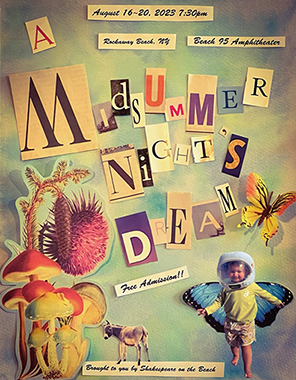
Poster by Beck (Rebecca) Schwab
“Hello, Rockaway!” says Theseus. Actually, Owen Loof is saying this. He’s known as the Best Dressed Man in Rockaway, the seaside neighborhood in New York's Borough of Queens, and tonight he's wearing a bright red jacket, glittering pink fedora, and silver and lavender shoes.
Hold on. That's not entirely accurate, so let’s start again.
“Hello, Rockaway!” says Owen Loof. Actually, Theseus is saying this. He’s the Duke and the best dressed man in ancient Athens, Greece, in this production of William Shakespeare’s A Midsummer Night’s Dream.
Having greeted the audience of about 300—people occupying lawn chairs and blankets or sitting on the concrete floor, blocks, and steps leading up to the Rockaway Beach Boardwalk, people standing on the boardwalk, people holding their skateboards, scooters, bicycles, coolers, or dogs—Theseus turns upstage and speaks the script's first three words, “Now, fair Hippolyta.” It's supposed to be a greeting to the Amazon Queen who, in three days, will become Theseus's wife. Loof, however, a Grand Knight of the Rockaway Beach Knights of Columbus Council #2672, delivers the line like an emcee, extending his arm as he presents Hippolyta to the audience. The audience dutifully applauds as Debra Ehara strolls on stage wearing camouflage pants and a dark armor-like vinyl vest. Ehara is cofounder of Shakespeare on the Beach, and her company’s debut production is underway in the Rockaway Beach 95 Amphitheater.
From this point, the play unfolds pretty much as Shakespeare wrote it. Getting to this point, however, has been fraught with theatrical catastrophe. The director dropped out 10 days before operning night because of health issues. A teenager took over as director. Several company members exited. Those who stayed doubled and tripled their loads and recruited two actors, each playing two roles, who joined the cast two days before the first public preview. The company ran out of money, and the advertised five-show run has been shortened to two previews and this opening/closing night performance. The capping catastrophe was Ehara being hospitalized after taking ill during rehearsal a week before her company's debut.
This was life imitating the very art it was presenting. Ehara was transported to the hospital as the cast was working for the first time on the play's final scene, the play within the play celebrating the Duke and Hippolyta's wedding. The Athenian laborers—"rude mechanicals," as Puck the fairy calls them—never got to rehearse their “most lamentable comedy,” Pyramus and Thisbe, because Bottom, cast as Pyramus, was transformed into a donkey-headed monster. After a night of euewing! in the woods, Bottom recovered from his malady and returned to his friends in time to present their play. After a weekend in the hospital, Ehara defied doctors’ orders and signed herself out in time for her to play in her play and for her Hippolyta to watch the rude mechanicals' play.
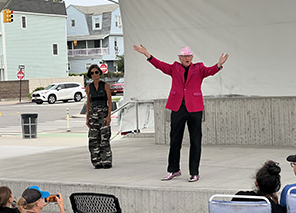
Theseus (Owen Loof) and Hipplyta (Debra Ehara) kick off a preview performance of Shakespeare on the Beach's debut production, William Shakespeare's A Midsummer Night's Dream in New York City's Rockaway Beach. Photo by Eric Minton.
Why? By that point she had every reason to quit this enterprise and a valid health excuse, too. "The only reason I didn't is because it felt worse not to do the play than to do it." She told me this a few hours before that evening's official opening and closing of Shakespeare on the Beach's inaugural production of the Bard's A Midsummer Night's Dream played by a cast with scant theatrical experience—many still on book, or, rather, on cell phone—led by an 18-year-old debuting director. And they were using a microphoned sound system for the first time without a test run.
Having watched both previews the previous evenings, I returned to the amphitheater for what I knew would be a most lamentable comedy and wondering how I’m going to salvage my trip here with a story worth posting on Shakespeareances.com. I’ve come from Washington, D.C., to mark the opening of this new company amid hard times for regional theaters. I prepaid my travel (I came by train and subway rather than hitch a ride to Rockaway Beach) and I prepaid my room at the Rockaway Hotel and Spa, all before this production’s hell cut loose. Attending the previews before crowds of about a hundred people, many friends of the company’s members, I saw manifested in the struggling actors the chaos I’d heard about. Now, as I was about to watch the lone official presentation of this company's first outing, I determined the only story available to me was a profile of perseverance rather than a review of the final product.
But something magical happens, and I am witness to one of the greatest and certainly happiest Shakespeareances of my life. Is it the fairies turning their supernatural power into real sorcery? Is it Shakespeare’s universal spellbinding touch? Or is it something in the Rockaway Beach water?
It is all three, but especially the latter two. Beyond this production’s lessons in perseverance, this tale is a takeaway for all local Shakespeare companies wherever they may be and at whatever level they may be. It starts with “Hello, Rockaway,” and ends with—well, we’ll get to that.
Rock-rock Rockaway Beach, Friday, August 18
Editor’s Note: Per AP Style, I always use last names on second references in my reviews and commentaries. Not this time. I’m in Rockaway, so it's all first names here.
From the beginning, this Midsummer Night’s Dream set out to be not just for Rockaway and about Rockaway but of Rockaway.
The company’s cofounders, Debra Ehara and Saxon Palmer, met as members of the New York Dippers Club. These are people who like to swim in the cold Atlantic surf every morning, including winter. Debra, who has lived in Rockaway 33 years, teaches English at the Brooklyn College Academy. She started a theater club there and, having earned her master’s degree in educational theater from the City College of New York, is trying to build a theater program for the high school. A longtime Shakespeareances.com subscriber, she invited me for the opening of her new community theater company. Saxon is a professional actor and director whose credits include several productions with New York's Theater for a New Audience. He has appeared in Shakespeareances.com reviews.
Discussing their mutual theater passion while dipping in the ocean breakers, the two decided that Rockaway deserved a Shakespeare company of its own. “We envisioned a theater company that made Shakespeare inclusive and accessible,” Saxon said in a Rockaway Times article. “Our company embraces diversity. Diverse talent. Diverse ethnicities and races. Diverse abilities in acting. Diverse ages. We’re not going for that polished finished product. We embrace diversity and inclusion because it tells a better story.”

The Rockaway Beach 95 Amphitheater, opened in summer 2022, sits alongside the Roackaway Beach Boardwalk. Shakespeare on the Beach's A Midsummer Night's Dream was the first theatrical prduction to use the space constructed as part of the community's recovery from 2012's Hurricane Sandy. Photo by Eric Minton.
In that article, written by Dan Guarino, who is in the cast as Starveling and Peaseblossom, Saxon equated the Athenian woods of the play with Rockaway’s beach culture “where forbidden desires are pursued.” He even wanted to stage the play on the sand beach. He and Debra turned to Patrick Tubridy, aka Paddy Tubz, for organizational and fundraising help. Seeing a chance to fulfill a dream of his own, Paddy convinced them to use the Beach 95 Amphitheater. Scion of a prominent five-generation Rockaway family, Paddy is a member of Screen Actors Guild–American Federation of Television and Radio Artists. He has film, television, theater, and internet credits. After Hurricane Sandy’s devastation of the Rockaways in 2012, Paddy advocated for recovery efforts to include a beachside amphitheater that could host performing arts, such as concerts and plays. The structure opened last summer, and Shakespeare on the Beach would be the first theatrical use of the space.
Paddy agreed to be the show’s producer, raising money while lending his own theatrical expertise to the endeavor. This helped turn the production into more of a community effort. Sponsors include In Good Company Hospitality, a Tubridy family business that includes The Rockaway Hotel, restaurants, and bars. The Knights of Columbus provided rehearsal space five days a week for six weeks; providing the Duke of Athens was a bonus. The 52nd Street Project provided costumes and props. Stage and backstage talent emerged from the New York Dippers Club.
This effort launched this past April. Debra was initially worried they were giving themselves too tight a timeline, but everything fell into place so quickly—the permits, the nonprofit status, the sponsors—that success seemed destined. Saxon began his role as director and cast himself as Puck. Debra, playing both Hippolyta and Titania, Queen of the Fairies, served as dramaturg and did the first cut of the play. The production comes in right at two hours without intermission, and the only thing of note missing is Fairy King Oberon’s famous speech, “I know a bank where the wild thyme blows.” How could you cut that? I ask Debra. She didn’t cut that.
Zoe Gilfix made that cut while Debra was in the hospital.
Zoe was the production’s stage manager and, though just 18, has several credits with the Rockaway Theater Company and other local theaters. When Saxon left the helm of A Midsummer Night’s Dream, Zoe took his place. By the time Debra got back into rehearsal, she decided to concentrate on her two characters and leave everything else to Zoe.
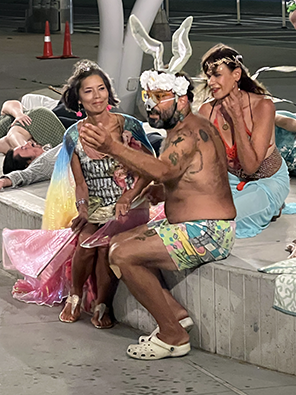
Titania (Debra Ehara, left) courts Bottom (Rob Bryn) as Cobweb (Barb Cool, right) watches and the lovers sleep in the background in Shakespeare on the Beach's production of A Midsummer Night's Dream. Photo by Eric Minton.
Debra, Paddy, and the entire cast acclaim Zoe this story’s hero. Last week, Debra warned me the show might not happen, and that was before her hospitalization. This Tuesday, Debra emailed me to say, "we're doing it" thanks to the efforts of an incredible stage manager. Zoe coalesced the remaining cast, managed all production matters, and molded the final product, including making more script cuts for time. As a writer and Shakespeare lover, I wince at the loss of Oberon’s speech. As an editor, I laud Zoe’s final cut of the play, which zips along even when actors are late for their cues. As for excising Oberon’s description of Titania’s bower, that just makes sense for this production: Rockaway may have wild thyme, oxlips, nodding violets, and luscious woodbine, but Rockaway's Fairy Queen wouldn't be sleeping on them. She would sleep on the beach.
Along with setting the play in Rockaway and much of the cast coming from the community, the characters were developed in the spirit of Rockaway’s more iconic elements, including Theseus played as Owen Loof and vice versa. Bottom is an egotistical surfer dude played with projected gusto by Rob Bryn. He’s a bit overbearing, but you gotta love the guy. As Bottom demonstrates what it takes to play a tyrant, Rob ends up doing battle with a passing motorcyclist roaring down Shore Front Parkway, which is, essentially, the amphitheater's backstage. I won’t say Bottom won that battle, but he thinks he did. Barb Cool plays Snug as a stoner who plays Lion in Pyramus and Thisbe as a punk rocker. After Bottom is “translated” with a donkey’s head, stoner Snug looks him over and says, “Nice ass!” To play Lion, Snug wears a blond wig that looks like it came from Tina Turner's estate, carries an electric guitar, and roars with Patti Smith ferocity, “I am woman, hear me roar!” Barb's dog, a little terrier named Charlie, follows her everywhere on stage. Surprisingly, he is not part of Moonshine’s ensemble, but Charlie grabbed his own spotlight in the first preview performance when he found that Thisbe’s Lion-mangled mantle made a comfortable bed. Bottom, in his big scene as Pyramus discovering Thisbe's supposed demise, had to first contend with gently convincing the little dog to give way.
The aforementioned journalist Dan Guerino—who also hits the local clubs as a stand-up comedian—wears tank top t-shirt, gym shorts, and laurel wreaths around his head and arm as Peaseblossom. He speaks his lines meditatively while standing in a yoga mountain pose. When his Starveling, playing Moonshine in Pyramus and Thisbe, can no longer endure the duke’s taunting, he goes all New York tailor, stepping to the front of the stage and addressing the audience: “Can I talk to you all here? I’m just trying to say that this lantern is the moon, I’m the man in the moon, and the dog ran off.” He gets one of the night’s biggest laughs when, late in joining the other mechanicals, he runs through the audience to the stage and breathlessly says, “Sorry, I could find no parking.” It’s an interpolation of the script, yes, but so in character for this Starveling.
Dan, however, didn’t do either of these improv moments in the two previews; he introduces both on this opening night.
The Week That's Passed
Most of the actors were far from occupying their characters during the previews. Some were stilted and awkward, others over-emoting. Those reading their lines from their mobile phones were, well, reading their lines from mobile phones. Despite sitting maybe 20 feet from the stage, I could barely hear anybody except Bottom, Lion, and the four lovers.
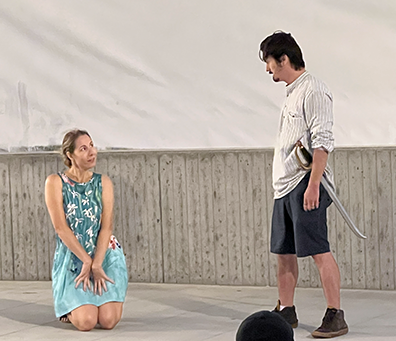
Andrea Woodbridge as Helena, left, presents herself as a spaniel to her great crush, Demetrius (Seamus O'Sullivan), whose unrequiting love has her chasing him through the Athenian woods until a fairy potion has him doting on her in Shakespeare on the Beach's production of A Midsummer Night's Dream. Photo by Eric Minton.
The four lovers, three of whom are not from Rockaway, emerged Wednesday night as exceptions to the production’s overall struggles: Andrea Woodbridge as Helena, Seamus O’Sullivan (Debra’s son) as Demetrius, Megan Benjamin as Hermia, and her real-life fiancé, former professional actor Andy Chmelko, as Hermia's fiancé Lysander. Joining the cast on Monday, Chmelko also plays Flute the bellows mender who plays Thisbe. Though reading from his phone, Andy imbues Lysander with endearing charm, and his Flute is hilarious as Thisbe, clearing his throat in baritone tones, then speaking his lines as a soprano.
Andrea and Seamus literally run laps as Helena chases Demetrius across the stage, around the stage, through the audience, and presumably up and down the five-mile-long beach. The first preview, I pegged Andrea as potentially one of the best performances of Helena I’ve seen in 36 stage productions of this play. It’s a hard role to manage in 21st century America, but Andrea makes believable Helena’s infatuation with Demetrius that leads her to make stupid decisions and arrive at incredibly wrong conclusions. She delivers her spaniel speech with intentional silliness, so cute I can’t imagine any guy not melting into her embrace—any guy but Seamus’s Demetrius, who is out-and-out scared of this stalker girl.
The Rude Mechanicals, other than Barb, were using paper scripts the first two nights. I wondered if this was intentional before learning they never got around to fully rehearsing the scene before their first Amphitheater run-through. However, the rude mechanicals reading from scripts fits the scene’s intended humor. Shakespeare even offers Bottom a golden moment when, as his Pyramus is grieving Thisbe’s supposed death, says, “Since Lion vile hath here deflowered my dear, which is—no, no, which was—the fairest dame that lived, that loved, that liked, that looked with cheer.” The obvious joke is Pyramus emphasizing Thisbe as past tense in the middle of his lament. However, Bottom already has forced major script changes on the play’s director, Peter Quince (played by Kaitlin Creed Boyce, who ended up playing Egeus and Puck, too). With script in hand as he’s playing the scene, Bottom could use Shakespeare’s “no, no, which was” as a grammatical correction, even taking out a pencil and editing the line much to Quince’s exasperation. At breakfst this morning, Paddy asked me how other outdoor-performing companies handle production and environmental issues. I described how Shakespeare, facing similar challenges in his time, built metatheater moments into his scripts and cite a couple of examples. Then, perhaps unwisely, I mention my idea of a still-on-book Bottom correcting Quince's script mid-performance as another such metatheater example. Paddy loved it and said he would pass my idea on to Rob. Uh-oh: I’d just crossed a theater critic’s ethical line by providing director notes to an actor. Hopefully, Paddy won't get the chance to tell Rob or will forget I mentioned it.
The cast already used one such meta practice during the second preview. Nearby JFK International Airport’s takeoff flight pattern goes right over Rockaway Beach; we had an airliner elephant walk of roaring jet engines in five-minute intervals drowning out everybody but Rob’s Bottom. The cast took to stopping the action, pointing up in the sky, and shouting “PLANE!” I don’t know if that's a “That’s Rockaway” thing, but by the fifth act the audience was joining in on the gesture, sometimes even pointing before the actors did.
Would that be just as fun for the opening night crowd with people who, presumably, don't know people in the show? Would the sound system be enough to counter the low-flying aircraft? Given that tonight's audience would be able to hear the players, would the actors grasp that they are playing characters, not merely reciting lines? Would this nascent Shakespeare on the Beach not embarrass itself into instant oblivion? These are the questions this world-traveled, professional Shakespearean audience member was asking himself. But I'm not from Rockaway; never been to this place before this week. My questions were pointing in the wrong direction.
That changed when the glittering Owen walked on stage and pronounced the theater company's first line of the first official public performance of its first production.
“Hello, Rockaway!”
“One of the things we kept saying is ‘Let’s just have fun. Just have fun,’” Debra had told me. “And make it Rockaway. We’d have things in the play that the audience would recognize.”
Whether it’s the cast’s just-go-for-it attitude, the actors being miked, or Shakespeare whispering in their ears, all performances tonight rise to the standard I’d been seeing with the lovers the previous nights.
The sound system is superb. All the actors are audible, and the mix is so perfect that Bottom doesn’t overpower it. Able to fully hear the performances, I discover how Debra’s stilted Hippolyta gives way to her powerfully poetic Titania. Most improved is Rachel Kramer who, like Andy, joined the company on Monday to take on two roles, Oberon and Snout the tinker (her Snout plays a blissfully accommodating Wall in Pyramus and Thisbe). Kramer had been flatlining Oberon’s verses the first two nights; tonight, her Oberon is thrillingly melodious but quite sinister. She’s still reciting from her mobile phone, but it works because the play is set in summer 2023: Oberon constantly checking his phone while conversing with Puck is typical rudeness of arrogant men and women haunting all communities across America. Tonight, Kramer expertly blends her need to reference her lines with her portrayal of the character.
The lovers raise their performances to new levels, as well; Seamus in a literal sense. On one of the Helena-chasing-Demetrius entrances, Seamus leaps and bounces his feet off one of the metal frames holding up the amphitheater’s roof. I’m not the only one who notices Seamus’s energy boost tonight. When Theseus awakens the lovers after their night of fairy hijinks, Seumus jumps up from the ground so quickly that Loof’s Duke ad libs, “You got up quicker than last night, that’s for sure.” A more credible character improv comes when Helena is telling Hermia how Demetrius has begun “to call me goddess, nymph…” Seamus’s Demetrius inserts “Divine,” the text’s next word but still part of Helena’s speech. Andrea, going along with it, nods to Demetrius, and resumes her litany: “…divine and rare, precious, celestial.” Demetrius looks on with self-satisfaction that he’s so darn good at this courtship thing.
Shakespeare created Bottom, played by Will Kemp in the play's first production, with improvisation in mind, so Rob saying to Peaseblossom, “Scratch my head, dude,” flows right into this production’s tone. When Rob gets to Pyramus grieving over Thisbe, he stops at “which is—no, no,” takes a pencil from his Renaissance costume, turns to Quince behind him, says, “was,” and corrects his script. I tense, but Rob and Kaitlin pull off the schtick so well, I relax as laughter trickles through the audience, and a big-bearded guy sitting near me guffaws mightily. I’d later overhear him tell somebody he’s an actor friend of Rob’s and has played Bottom a couple times himself.
Other elements tonight could be credited to fairy magic. JFK is taking off its flights to the northwest, away from us. An ambulance rushes past on Shore Front Parkway with its lights flashing but no siren blaring. Did Paddy send out a memo, or what? Talk about community spirit.
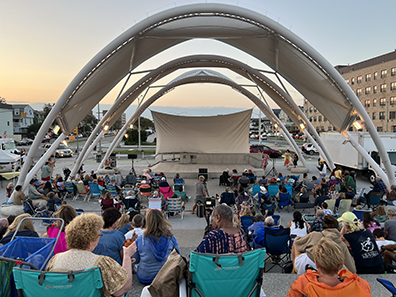

About 300 people would pack the floor and concrete steps up to the Rockaway Beach Boardwalk where more people stood to watch Shakespeare on the Beach's opening night of William Shakespeare's A Midsummer Night's Dream at the Rockaway Beach 95th Amphitheater. Even the dogs watched the play with rapt attention. Photos by Eric Minton.
That spirit is palpable in the crowd. They cheer not just Hippolyta’s introduction, they also cheer every time Quince calls out an actors’ name on his scroll. They cheer every scene’s end; heck, they cheer every time a character leaves the stage. They hoot at Lysander’s attempted seduction of Hermia in the woods, er, on the beach. Depending on gender, they cringe or laugh when Hermia knees Demetrius in the crotch after he asks for his reward for assuring her of Lysander’s whereabouts. Everybody laughs with Seamus’s delivery of Demetrius’s next line after Hermia runs off: “There is no following her in this fierce vein,” fierce vein being what he’s feeling between his legs. When Quince describes Pyramus—and thereby why Bottom should play him—as “a sweet-faced man; a proper man, as one shall see in a summer's day,” somebody in the audience behind me whistles appreciatively. Rob has a lot of fans here.
All this cheering is not just good manners. The audience is rapt. I look around and see all eyes, human and canine, focused on the stage. This play has a lot of slapstick, but Shakespeare also wrote a structurally finessed comedy. Titania has been sleeping at the back of the stage through two scenes and 287 (pre-cut) lines before the ass-headed Bottom’s singing awakes her. “What angel wakes me from my flowery bed?” she says. A laugh meter could measure the audience’s investment in any Dream production with this line, and tonight that meter would hit 10. And the laughs build with subsequent lines. “Thou art as wise as thou art beautiful,” she tells Bottom. Fits of laughter gusts through the amphitheater. “EUEW!” Rob replies, braying in a car-wreck screech that could either by premature ejaculation or utter fear. We're gettng gale-force laughter now. The play’s content also goes beyond its structure to encompass the community. When Bottom tells Titania he has “a great desire to a bottle of hay: good hay, sweet hay, hath no fellow,” knowing chuckles ripple through a crowd containing some of Bottom’s fellow stoners.
At play’s end, Boyce delivers Puck’s epilogue. When she lands with genuine sincerity on the line “Give me your hands, if we be friends,” the audience responds with unfettered gratitude. The sound system begins playing “(I’ve Had) The Time of My Life” from Dirty Dancing, and the cast rushes into the audience for what becomes a throbbing block party. All around me are actors and spectators dancing with each other, hugs, handshakes, tighter hugs, fist bumps, lung-crushing hugs, smiles, smiles, smiles. There are proud friends and more-doting-than-ever lovers. A 4-year-old boy makes the rounds of meeting the actors, who are assured by his mother that “He watched the whole thing.” Her tone indicates she didn’t think her son was capable of such a thing. I turn and see Seamus tightly embracing Debra, the mother sobbing into her son's neck. I’m sure that feels so much better than quitting would have.
It’s Magic Time
The fairy dust at work here is the community of Rockaway Beach itself, a spirit of no common rate. From the moment New York Dippers Debra and Saxon hatched the notion of a Shakespeare on the Beach for Rockaway, the people and places of this community formed the fabric of the entire enterprise.
True, this was an amazing tale of dedicated perseverance that can inspire us all. More importantly, this is a case study in community theater which, by my definition, is what community means to each and every community and how a theater can reflect that back to the community. Shakespeare "was not of an age but for all time," his friend and rival Ben Jonson wrote; but Shakespeare also was not of a place but for all spaces. I know this because I've seen his plays in just about every space imaginable and in every setting available. Thinking back over the 900 or so productions I've attended, I don't recall ever seeing a Shakespeare play so fully integrated into the personality, geography, culture, and spirit of the community where the play is being staged (The Folger came close with its 2009 production of Much Ado About Nothing set in a modern D.C. Caribbean neighborhood). Shakespeare on the Beach's production of A Midsummer Night's Dream staged for Rockaway truly is about Rockaway and of Rockaway.
When it comes to regional theaters, perhaps it’s not enough that you want to bring Shakespeare into the community; you should start thinking seriously of bringing the community into Shakespeare, one play at a time. That is the concept Shakespeare on the Beach is pursuing as they hope to stage other plays in the canon, Debra says. Tonight, that concept worked beyond measure.
Eric Minton
August 28, 2023
Reader Comment
I've recently read your review of Shakespeare on the Beach's production of A Midsummer Night's Dream on August 18th. I wanted to let you know that I agree with what you wrote and loved seeing all the kind words about the production. I did notice, however, that there was practically no mention of Megan Benjamin and not only her role as Hermia but her role behind the scenes. This was surprising to me for many reasons.
As someone who also saw the production, I found her performance as Hermia to be a powerful and multifaceted highlight of the show. She was strong, funny, exuberant, sexy, vulnerable…sometimes all at once. Her fight scene with Helena was a consistent crowd pleaser, and her romantic moments with Lysander never failed to elicit hoots and hollers. Every bit of her passion about this role was clearly evident onstage.
But Megan's professionalism and creativity extended beyond her onstage work. Just two and a half weeks before the first invited dress rehearsal, she was put in charge of the production's social media presence. By the time of Midsummer's first dress, the show's Facebook page had over 300 followers and its Instagram page had over 200. I have no doubt that an overwhelming number of the people at the two dress rehearsals and the performance were there thanks to her tireless efforts to promote this show as something not to be missed.
It is for all these reasons that I would have liked to have seen a bigger mention of Megan's onstage and offstage work in your review.
Sincerely,
Emily Parker
Comment: e-mail editorial@shakespeareances.com
Start a discussion in the Bardroom
Cast


